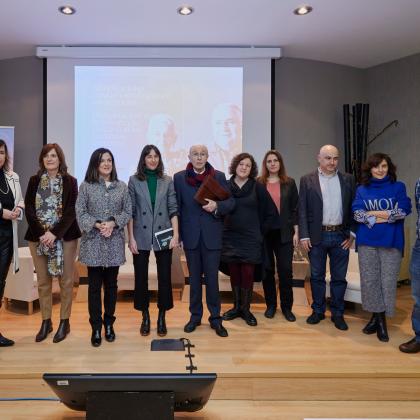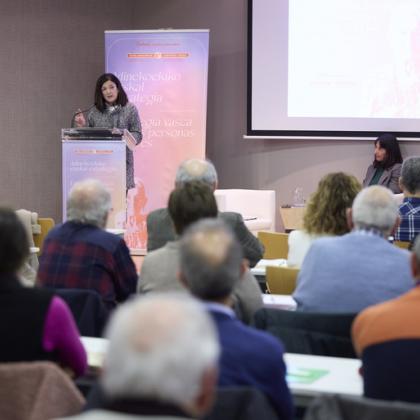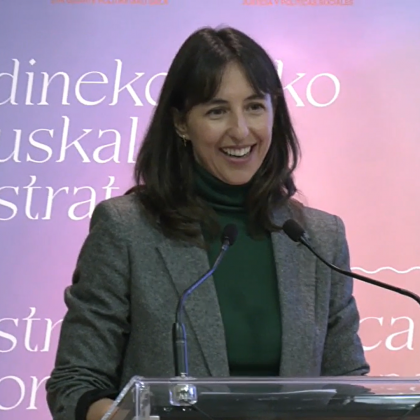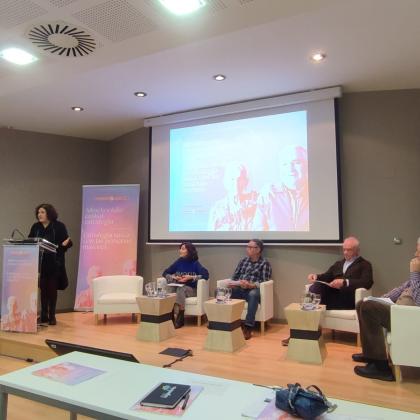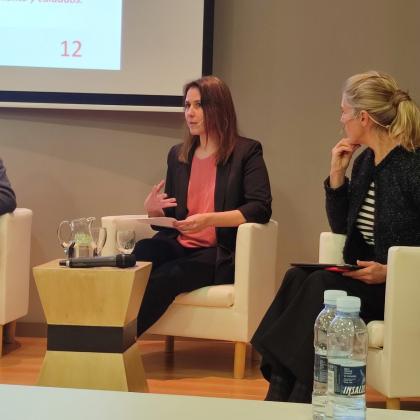- The strategy is based on eleven driving projects to promote five axes: active citizenship, transitions and life projects, autonomy and fragility, attention and care, and research and innovation.
- Councillor Artolazabal highlights that the strategy includes "a change of perspective based on a different conception of what it means to grow old".
- In 2020, 22.5% of Basque citizens will be aged 65 or over, and it is expected that by 2060 the number of octogenarians in the Basque Country will double the current figure.
- Matia Instituto has participated in the development of this new strategy and is coordinating three projects that are the driving force behind it: Euskadi Lagunkoia, Helduak Zabaltzen and the Longitudinal Study on Ageing and Care
Vitoria-Gasteiz, 20/01/2023
Beatriz Artolazabal, Basque Minister for Equality, Justice and Social Policies, this morning presented the Basque Strategy for Older People 2021-2024, "a central strategy of this legislature". She did so accompanied by different agents involved in policies for the elderly and, in particular, by those who make up Euskadiko Adinekoen Batzordea, the committee participating in the Basque Civil Dialogue Table, dedicated to the construction of public policies aimed at the elderly and made up of associations representing the elderly.
"In this legislature, with your help, we have made the transition from the concept of active ageing to the new formulation of a full life", the Basque Councillor acknowledged. "It has been key to integrate active ageing within the full life approach both for autonomous people and for those who require increasing support and care. This change of perspective is based on a different conception of what it means to age". Because, he stressed, "the achievement of this full life depends to a large extent on the satisfaction of the basic needs of each person, from their diversity and heterogeneity, according to their personal abilities, resources, limitations and changing capacities".
Based on this new perspective, the Basque Government has drawn up the new Basque Strategy for Older People 2021-2024. This is the third strategy that looks at the elderly, being "the most ambitious and the most complete, because, with humility, we have sought the advice of those who make up an organisation, and at the same time the driving force behind this Strategy, Euskadiko Adinekoen Batzordea". The associations that form part of this council: Euskofederpen, Lares, Agijupens, Nagusiak, Las Cuatro Torres, Helduak Adi, Secot, Nagusilan, have been active agents in drawing up this new project.
This strategy with the elderly is based on the need to generate a new model for approaching the ageing process from the active protagonism of the elderly themselves. To do so, it is guided by the following principles: equality, diversity, equity, self-realisation, co-creation and solidarity between generations. Inspired by these principles, the Basque strategy deploys five lines of intervention with the following objectives:
- Promote active citizenship based on rights, participation and friendly communities;
- Facilitate transitions and the development of life projects;
- Support anticipation, prevention and the promotion of autonomy;
- Promote a social care policy and the transition to a new model of long-term care; and
- Generate knowledge from research and innovation and the promotion of the silver economy.
These lines of intervention are materialised in a dozen projects, some of them already underway, which are articulated in five axes:
- Axis I. Active citizenship
- Axis II. Transitions and life projects
- Axis III. Autonomy and Fragility
- Axis IV. Care and Caregiving
- Axis V. Research and Innovation
These projects are: Euskadiko Adinekoen Batzordea; Helduak Zabaltzen; Agenda Nagusi; Euskadi Lagunkoia; Altxor; Bizitza Betea; betiON; the social care policy; Zaintza Lurraldea; longitudinal study on ageing and care; and the NEXT-CARE project.
The 'longevity revolution' in data
The Basque Councillor explained that the so-called longevity revolution is one of the most important transformations to be undertaken by the Basque Country in the 21st century. The way of defining old age, the way of understanding and approaching life, and even the patterns of health and illness are undergoing accelerated transformations.
In 2020, a total of 499,432 people aged 65 and over were counted in the Basque Country, accounting for 22.5% of the total population. Of these, 157,950 were people over the age of 80, 7.1% of the total population, and 30.7% of the population over the age of 65, according to data from the National Statistics Institute (INE).
Furthermore, according to the Basque Statistics Institute - Eustat, life expectancy at birth has increased from 69.6 years for men and 76.9 years for women in the period 1975-1976, to 80.8 for men and 86.6 for women in 2018-2019. So it has increased by more than 11 years for men and more than 9 years for women in the last 40 years.
It is predicted that by 2060 the weight of the octogenarian population in the Basque Country will double the current figure and account for 15.6% of the total population. By that year, almost half of the elderly population will be over 80 years of age. And the increase in the number of centenarians will be even more evident. However, it should also be borne in mind that the weight of the over-65 population will start to shrink by 2060 as a result of the passing of the baby boom cohorts and the smaller size of later generations. Thus, although the overall weight of the older population will decline, the older population will increase considerably.
Another feature of ageing is the greater female predominance caused by higher male mortality at all ages and higher life expectancy in women.
This strategy seeks to provide care and support for the great diversity of elderly people in the Basque Country: from the youngest to the oldest; from the most active to those in need of care. Bearing in mind that 80% of elderly people in the Basque Country are self-employed.

